Houthis will learn what fellow Iran-backed groups learned - Netanyahu
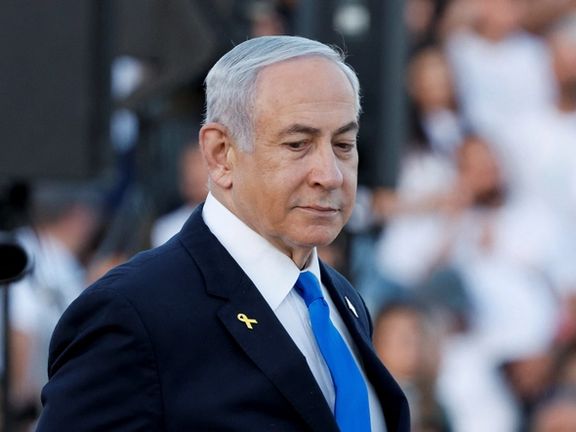
The Israeli prime minister said Wednesday Yemen's Houthi militants will learn the lesson fellow Iran-backed militant groups like Hamas and Hezbollah learned from the Jewish state.

The Israeli prime minister said Wednesday Yemen's Houthi militants will learn the lesson fellow Iran-backed militant groups like Hamas and Hezbollah learned from the Jewish state.
"Israel is striking the enemies and those who thought they will sever our lives here, so it will apply to everyone," Benjamin Netanyahu said on Wednesday.
"The Houthis too will learn what Hamas and Hezbollah and Assad’s regime and others learned, and even if it takes time this lesson will be learned across the Middle East," he added.
His comments came two days after his defense minister, Israel Katz, vowed to "behead" the Houthis' leaders in response to their ongoing missile and drone launches against Israel.
"These days, when the Houthi terrorist organization is firing missiles at Israel, I want to convey a clear message to them at the beginning of my remarks: We have defeated Hamas, we have defeated Hezbollah, we have blinded Iran's defense systems and damaged the production systems, we have toppled the Assad regime in Syria, we have dealt a severe blow to the axis of evil, and we will also deal a severe blow to the Houthi terrorist organization in Yemen, which remains the last to stand," Katz said.
"We'll severely cripple the Houthis, damage their strategic infrastructure, and we will behead their leaders – just as we did to Haniyeh, Sinwar and Nasrallah in Tehran, Gaza and Lebanon – we will do it in Hodeidah and Sana'a," Katz added.
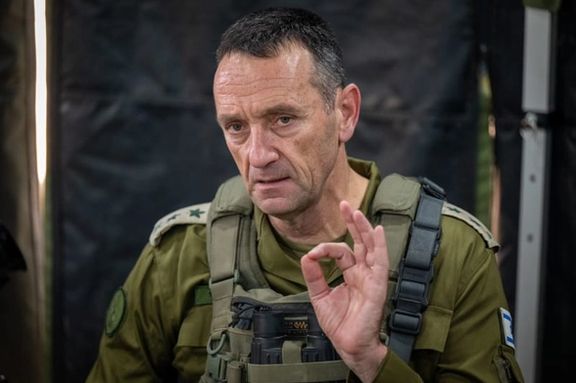
Israel's top military commander has issued a warning to Iran and its armed regional allies against further attacks on the Jewish state, saying that Israel is prepared to respond at a time and place of its choosing.
“Iran should know, its proxies should know and the entire Middle East, anyone who tries to undermine the stability and security of the State of Israel, the IDF will stand firm against them, ready to strike at any time and in any place,” the Israel Defense Forces (IDF) Chief of Staff Herzi Halevi said on Wednesday.
He made the remarks at a pilot graduation ceremony, two days after the Israeli prime minister vowed to continue targeting anyone who tries to harm the Jewish state, amid growing calls by Israeli officials for more direct strikes on Iran in response to the ongoing attacks on Tel Aviv by Tehran-backed Houthis.
"Israel is consolidating its deterrent power, it is striking at those who seek to harm it, it is collapsing Iran's terror branches one after the other," Benjamin Netanyahu told the Israeli Knesset.
Netanyahu said Tehran was still "busy licking the wounds from the blows we inflicted on them", adding he had instructed the Israeli military in recent days to attack strategic targets of Yemen's armed Houthi group in response to their missile launches at Israel.
The Houthis fired another missile at Israel on Tuesday, despite multiple airstrikes by the United States and Israel against their positions in Yemen over the past few days.
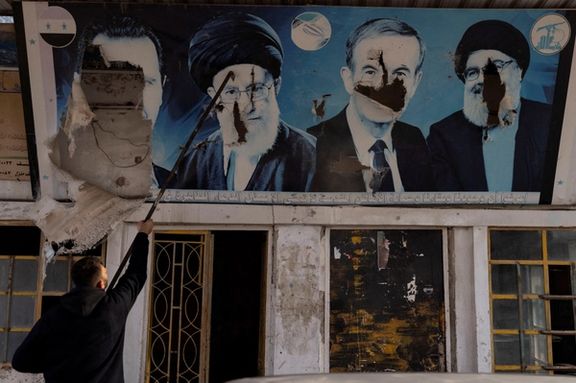
Syria’s new administration is preparing a $300 billion compensation demand against Iran for damages caused during its support for ousted President Bashar al-Assad, according to Lebanese outlet Al-Modon on Tuesday.
The compensation is intended for “the Syrian people and the Syrian state, for the harm caused by Tehran’s ‘criminal and arbitrary’ policies to the Syrians and the Syrian infrastructure during its military alignment with its militias in favor of the regime of the ousted president, Bashar al-Assad,” Al-Modon quoted an unnamed source close to Syria’s new political administration as saying.
While Syria accuses Iran of causing extensive harm to its people and infrastructure, Iranian politicians are grappling with the opposite concern—the potential loss of billions Iran invested in propping up Bashar al-Assad’s government.
Iranian Foreign Ministry spokesperson Esmaeil Baghaei addressed these concerns last week, dismissing claims that Syria owes Iran between $30 and $50 billion, calling the figures exaggerated. He explained that any debts would transfer to Syria’s new political system under the principle of state succession. “These figures, such as the claim of a $50 billion debt owed to Iran by Syria, are truly very exaggerated,” Baghaei said.
Conflicting reports about Iranian embassy reopening
Adding to the tension, an Al-Modon source denied any ongoing communication between the Iranian government and Syria’s new administration. The source said, “Communication between the new administration and Iran is completely cut off,” and added, “The new administration has no current plans to engage with Iran, whether regarding an embassy in Damascus or a consulate in Aleppo.”
This is while, the Iranian government spokesperson Fatemeh Mohajerani on Tuesday said that Iran is in talks to reopen its embassy in Damascus.
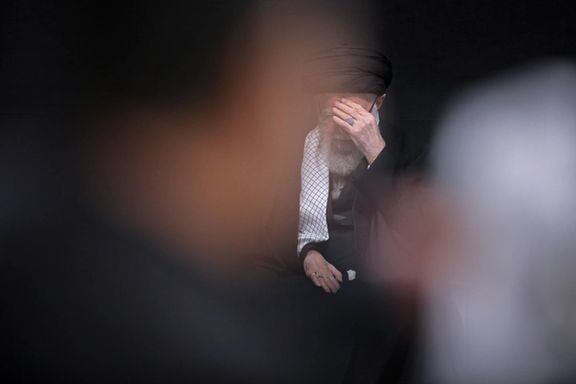
The world is witnessing a period of significant regional setbacks and retreats for the Islamic Republic. After two decades of massive financial expenditures and international isolation, Tehran’s strongholds and allies are crumbling one by one across the region.
This phase began with the defeats of Hamas and Hezbollah, continued with the weakening of Bashar al-Assad and Iran’s diminishing influence in Syria, and is now advancing as Israel focuses on defeating the Houthis in Yemen.
Evidence suggests that even Iraq’s pro-Tehran Hashd al-Shaabi militia has scaled back its overt support for the Islamic Republic’s agenda, leaving Tehran increasingly isolated in the face of an alliance comprising the US, Israel, and even Europe. Domestically, severe economic challenges and widespread public dissatisfaction have created one of the most difficult periods in the history of the Islamic Republic.
In this context, the overall US policy is combining political, economic, and even military pressure to push the Islamic Republic to the negotiating table. The aim is to reach an agreement stricter than the JCPOA, either halting Iran’s nuclear and missile programs or exposing it to intensified pressure and even potential military action if it refuses to comply.
Despite its structural weaknesses and mounting international pressures, the Islamic Republic’s leadership remains defiant. Supreme Leader Ali Khamenei threatens nuclear weaponization and reclaiming Syria, while simultaneously sending signals of willingness to negotiate through diplomats like Mohammad Javad Zarif. However, it appears that the US, Israel, and even Europe are aware of the dangers of a resurgent Islamic Republic and are determined to prevent it from returning to a position of defiance and belligerence.
The chain of setbacks for the Islamic Republic began with Hamas’ attack on Israel in October 2023. Tehran mistakenly believed this assault would inflict an irreparable defeat on Israel.
Misguided analyses by the Islamic Republic’s leaders, particularly Khamenei and IRGC commanders, led to decisions that resulted in a series of defeats.
In response to the attack, Israel acted swiftly, strengthening its regional position within 15 months. This included large-scale military operations against Hamas, destruction of its military bases, and the assassination of senior leaders such as Yahya Sinwar, Saleh al-Arouri, and Ismail Haniyeh. Israel also ignored warnings from the US and the international community to launch an offensive in Gaza, leveraging force to reshape the Middle East.
The second major misstep by the Islamic Republic occurred when it urged Hezbollah to attack Israel’s northern borders in support of Hamas. Initially, Israel issued repeated warnings for Hezbollah to cease its aggression. When these warnings were ignored, Israel launched an operation dubbed New Order, which delivered surprising results. These included the destruction of Hezbollah’s command centers and equipment, as well as the killing of senior leaders, including Hassan Nasrallah. These developments fundamentally altered the region’s dynamics and demonstrated that, like Hamas, Hezbollah lacks the capability to withstand Israel’s extensive military campaigns.
On the international stage, the US and Europe, recognizing the Islamic Republic’s vulnerabilities, are now seeking to capitalize on this opportunity to drive significant changes in Iran’s regional policies. Meanwhile, Israel’s aggressive strategies aim to keep Tehran on the defensive.
Within Iran, widespread public dissatisfaction with the regime’s policies and economic mismanagement has deeply affected the country’s social and political landscape.
Popular protests and civil movements highlight the critical role of the Iranian people in shaping the nation’s future. The convergence of international, regional, and domestic pressures has created a historic opportunity to move beyond the Islamic Republic.
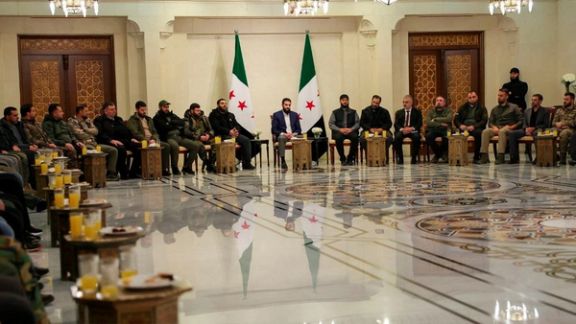
Syria’s new foreign minister warned Iran not to destabilize the country's fragile calm after a call by Iran’s Supreme Leader for Syrian youth to rise up against the new Sunni Islamist rulers.
"Iran must respect the will of the Syrian people and the country's sovereignty and security. We warn them from spreading chaos in Syria and we hold them accountable for the repercussions of the latest remarks," Asaad Shaibani said on X.
His remarks, made on Monday, are the most direct and public warning by Syria’s new rulers to Tehran since the fall of Tehran's ally, President Bashar al-Assad.
The reaction follows calls from Iran's Supreme Leader, Ali Khamenei On December 22, who said: “We predict that a strong and honorable movement will emerge in Syria, as the Syrian youth now have nothing to lose.
"Their schools, universities, homes, and streets are unsafe, so they must stand resolutely against those who design and execute insecurity and overcome them with determination.”
Ahmad al-Sharaa, the former rebel leader who now holds power in Syria, had previously criticized the Islamic Republic for its meddling in Syria by participating in the civil war since 2011, supporting the decades-long Assad dynasty.
He blamed Iran’s military presence and its allied militias which supported Assad for the death and displacement of millions of Syrians.
However, this is the first time Syria’s new officials have openly responded to remarks by Khamenei and other Iranian officials who oppose the group who deposed al-Assad in record time, and are now receiving international support.
Iran sided with Assad in the early days of a popular movement in Syria demanding a change of government. Soon Tehran began deploying troops and fighters to defend the government against protesters and rebels. Hundreds of thousands of Syrians died in the ensuing 13-year civil war.
This was not the first time Khamenei suggested Syria's new rulers would be toppled.
“Everyone should know that things will not remain as they are … Certainly, the courageous Syrian youth will rise up, resist, and, even at the cost of casualties, overcome this situation, he said in a speech this month.
Syria would be won back "just as the brave Iraqi youth, after the US occupation, with the help, organization, and leadership of our dear martyr Qasem Soleimani, managed to drive the enemy out of their homes and streets," Khamenei said.
"This may take a long time in Syria, but the outcome is inevitable and certain.”
Last week, Syria’s new leader Ahmed al-Sharaa said Syria's opposition had “set the Iranian project in the region back by 40 years,” signaling a major shift in Syria’s stance toward Iran.
“By removing Iranian militias and closing Syria to Iranian influence, we’ve served the region’s interests—achieving what diplomacy and external pressure could not, with minimal losses," he said.
Iran’s exit from Syria marks a serious setback for Tehran’s ‘Shiite Crescent’, built over the past two decades to extend its control west to the Mediterranean coast, by creating proxy groups in Iraq, supporting Assad in Syria and Hezbollah in Lebanon.
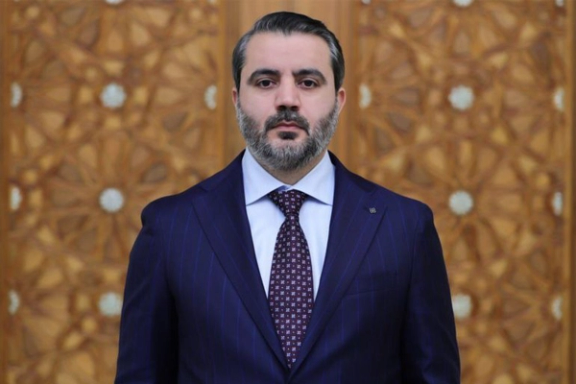
Syria's newly appointed foreign minister, Asaad Hassan al-Shibani, warned Iran on Tuesday against spreading chaos in Syria, a few days after Iran's Supreme Leader threw his weight behind another regime change in the Arab country.
"Iran must respect the will of the Syrian people and the sovereignty and safety of the country, and we warn them against spreading chaos in Syria and we also hold them responsible for the consequences of the recent statements," the Syrian minister said in a post on X.
His remarks came shortly after Iran's Supreme Leader Ali Khamenei openly opposed Syria's new government, spoke of the need to overthrow it, and announced plans to form a group to combat the Damascus administration.